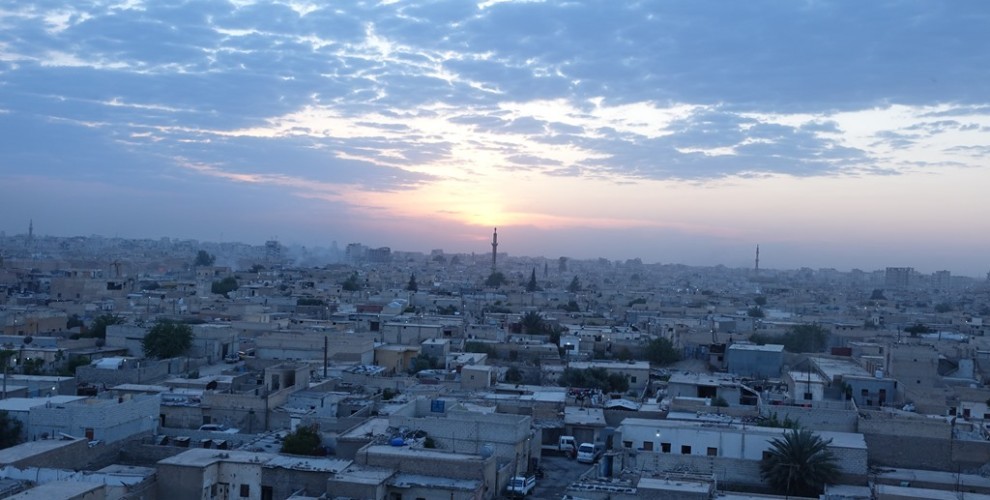Raqqa: A city is being rebuilt
The people of Raqqa experienced their darkest years under the rule of the ISIS and immediately after liberation they began to build a free and dignified life based on the coexistence of peoples.
The people of Raqqa experienced their darkest years under the rule of the ISIS and immediately after liberation they began to build a free and dignified life based on the coexistence of peoples.

Following the end of the four-year ISIS occupation, the newly-formed Civil Council of Raqqa immediately began rebuilding the city after the liberation by the Syrian Democratic Forces (SDF). Despite limited opportunities, the reconstruction committee carried out intensive work. One of the first tasks was to clean up the streets and neighborhoods of the rubble left behind by the IS. Gradually, life in the city is normalizing and 140,000 families have returned to Raqqa. The flow of returnees is even increasing.

The population has organized
The Civil Council of Raqqa founded 25 local civilian councils after the liberation of the city. On the one hand, it was about preventing the city from ever returning to occupation and, on the other hand, meeting the needs of the returning population.
Clearing the city from rubble
The Reconstruction Committee began its work by evacuating the mines laid by ISIS everywhere in the city. The city was divided into 26 different areas for clearing and organizing. The Civil Council of Raqqa provided construction and cleaning vehicles amidst limited possibilities. The committee was able to clean 28 main axes and five areas of ISIS warehouses in a short time and started clearing the remaining 21 areas.
The committee also established an emergency intervention team of 38 people. The team includes doctors and specialists from various disciplines. In addition to emergencies, it is dedicated to the investigation of mass graves created by ISIS. The team has so far recovered 600 bodies in the city.
The committee is also working on solving the emergencies of the now over 250,000 inhabitants strong city.

Drinking water problems solved
A city-based committee of engineers immediately began working on a solution to the city's drinking water problem. 33 new pumping stations were set up and made available to the population. The committee managed to supply drinking water to each of the areas inhabited by between 15,000 and 55,000 people and built completely new pumping stations in El-Zehra, El-Mensûr, Abid El-Sefsafî, Til Semin, El-Kalit, Seîda, Elo Kebîe, El-Barûd, El-Hora, El-Widiyan, El-Refi, El-Sifsafa, Meslexê, Hemrat, El-Keramê, and Ebû Wehel. Work on the pumping stations in El-Cedîdat, El-Şahir, El-Simêhat and El-Ednaniye is still ongoing. The committee has set up training programs for the operation of the pumping stations. In addition, the water pipes in the districts of Meşleb, Haşim Bin Ebdulmelek, Teyar, Heswiye, Mefreq El-Cezrar and El-Romaniye were completely repaired.

Irrigation canals
The Reconstruction Committee has launched 40 irrigation channel projects for Raqqa's agricultural land. The construction works in the regions of Hezîma and Tişrîn have begun. Within the framework of this project, a region in which about 30,000 people live will be irrigated. The committee has also begun to rebuild 50 bridges in the city destroyed by ISIS.

Power lines
Another focus of the committee is the reconstruction of the facilities destroyed by the ISIS for the operation of the power grid. The committee first began repairing the electrical distribution station in the Firûsiyê region and is now working on the lines south of the city. After completing the work, a trouble-free power supply should be ensured. The committee has also begun repairing irrigation canals and pipelines leading to 27 villages in the El-Heşim region.
Regional committees and city administration
In order to complete work on the reconstruction of the city as quickly as possible, the Civil Council has cooperated with the city administration. The self-government, founded on March 10, 2018, has commissioned specialists to identify existing needs.
The city administration is repairing the sewer system at the moment. The water pipes, which provide the houses and parks with drinking water, have already been repaired. For the returnees, these tasks created jobs. The city council has also opened additional service bureaus in villages such as Kermê, Hos, Hemrat, Esediye, Kesrat, Hezîme and Kidîran. In addition, 67 bakeries were opened in the city, in which a total of 131,950 breads are produced daily.
The schools of the city
Seventy percent of the approximately 400 schools were severely damaged by the ISIS. After the damage was detected by engineers, it was found that about 50 billion Syrian liras were necessary to restore the schools. About 400,000 students live in the city.
Health care
The largest hospitals offering free health care were the Wetenî Hospital (Niştimanî) and the Women's Hospital. Both are out of order due to ISIS destruction. Since the liberation, the repair of the hospitals is running, but it is not yet completed. The health committee opened the Xatûniye Health Center in the center of Seyf-El-Dewle and provides service to the villages in the east and the Kermê Health Center in the west.
In addition, the Kurdish Red Crescent (Heyva Sor a Kurd) works intensively for health care in the city. In particular, first aid and emergency medical care is provided by Heyva Sor a Kurd. In addition, a mobile health center has been set up, which plays an important role in the treatment of the population.
The gas, sugar, cotton and biscuit production facilities in Raqqa had also been destroyed by the ISIS. Ebdulah El-Eryan from the reconstruction committee reports that the work is being done in collaboration with the international coalition against ISIS.
